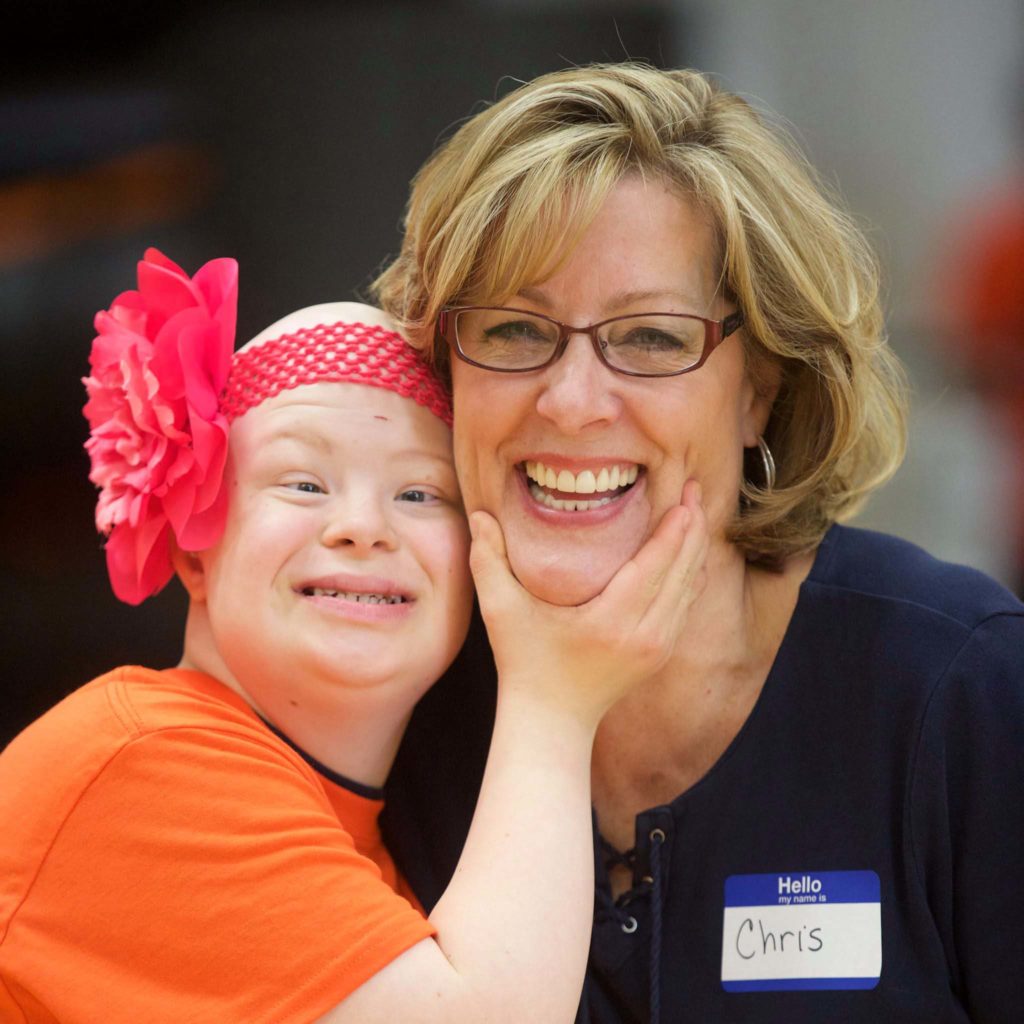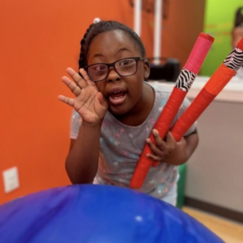Worth it! | One Moms Story of Advocacy
We are happy to invite a longtime friend of GiGi’s Playhouse to the #gigisblog today. Chis is a gift to this community and is so ready to share her experiences with us all! Pull up a chair, grab a mug of your favorite beverage and be reminded of the power we all have to bring positive change.
Worth it!
I originally wrote this post for the purpose of helping others understand that although there are frustrations, prejudices, hypocrisies, and biases towards those with DS and other disabilities, with education, cooperation and compromise (and not just by the families) we can work together in order to help the child succeed in school. I didn’t start out as a parent of a child with Down syndrome knowing what to do or say when roadblocks were put in our way. Since becoming involved with GiGi’s Playhouse McHenry County over 8 years ago, I’ve gained so much knowledge, connected with families and learned how to navigate the education and healthcare systems with strength, creativity, and courage. This is just one of our stories.
As a parent of an 8th grader, I received a letter from the school indicating that the annual, mandatory, standardized tests were approaching in late September. This year the students would travel to the high school to take them. Tables would be set up in the gym to accommodate a large number of students. As the date approached, we continued to get additional information and general reminders such as to be sure our child got sleep, ate breakfast and did his/her best. As the date approached, we got another gem of information: because Rebecca needs accommodations in order to take the test, she would be left behind at the middle school and take her test there.
What? Why? Is the high school incapable of providing the necessary accommodations outlined in her IEP? (IEP= Individualized Education Plan, a fully-legal document.) Who made this decision? What are the reasons?
So I did what I always do and called Rebecca’s case manager (person on her team of teachers who acts as the official contact person between the family and the school, as well as many other important duties – we have a good one.) What she was able to tell me was that any child who needed accommodations (i.e. more time, have the questions read aloud, have a person scribe for the student, etc.) would be left behind to take the test in their own school. I really wanted to get more information, so I contacted an individual from the high school, a person of school importance and authority. When he called me back he had an individual from the Special Education department on the call, too.
To put it in a nutshell, all of the 8th graders from the four middle schools in the district were invited to take the test at the high school- except for those needing accommodations. The high school didn’t have room for them. They didn’t have the personnel to administer the test to “those” kids. They felt it was a wonderful opportunity for the rest of the students to get extra exposure to high school life, in addition to the tour they will all take in January. When I objected and reminded them that many of those kids being left behind were probably the very ones who would benefit from an extra visit, I was reassured that they planned on having a SPECIAL day for the SPECIAL students to take a tour, and Rebecca could come on that very SPECIAL day. I firmly reminded them that Rebecca would not partake on that SPECIAL adventure, as she has been in general education classes since kindergarten and would come with her peers.
I questioned them as to the thinking behind this decision of turning this test into a field trip. I was told it was to help the kids take these tests seriously and focus during them. I really have to wonder if putting kids on a bus to take a test (most of whom already knew was a big deal in the eyes of the school), placing them in an unfamiliar environment (new sights, new sounds, etc.) and expecting them to concentrate better, is a sound plan. I see this as adding unnecessary stress to 13 and 14 year olds who are already dealing with the physical and mental changes of puberty and all the fluctuating hormones and thinking processes during this time, then adding major changes to their familiar surroundings and expecting them to do better. We discussed many options, such as don’t send the students if you cannot send them all (as a side note, substitute the words African American, Hispanic or Latino for those with disabilities/needing accommodations and see if it sounds acceptable to exclude a subset of students!); schedule a second trip to the high school if they think it is necessary for a second official tour; give all of the kids an option to remain behind in familiar surroundings to limit the outside stress load.
I ended the call after making the most important point. Regardless of what the high school intended, most of the students viewed this as a field trip. Period. And when students in middle school are not allowed to go on a field trip, it is because they have done something bad. So what they have successfully done is to tell each of these kids from each of the middle schools feeding into the high school is that they, the students, are in error; that they are wrong or defective by needing these accommodations. These students heard it loud and clear that they were not worth the effort to find space for or come up with another solution to include all of them. Some of these students feel they have been branded and labeled as stupid. The message from the high school was crystal clear: there is not a place for you here.
We gave Rebecca the option to take the test at the high school, stay at her middle school with the other students left behind, or stay home. She chose to remain at the middle school to take the test.
Inclusion and integration is hard work, both in school and in our society. We have to start thinking with more compassion, empathy, and acceptance. We have to ask ourselves “Is this the way I would want to be treated?” “Is this the way I would want my child/sibling/loved one treated?” If the answer is no, then find another solution. Just because a student needs more time to complete a test or an adult needs a chair instead of standing to perform their job, what difference does it make in the end? It’s a learning process and it takes time. Based on the past 9 years my daughter has been in public schools, we have all benefited from information sharing, rational discussions, trials and errors, and a willingness to adjust our outdated ideas and practices. We have to truly believe that inclusion and integration in schools will lead to better life successes for those pushed away so readily by society.
Throughout Rebecca’s schooling, there have been teachers and administrators who have listened to us, voiced their concerns and then worked towards making sure
Rebecca had a successful year. They were the collaborators, creators, and innovators. They were the ones who opened their hearts to a gentle and sincere little girl who knew how to show kindness, humor, and love towards others. They were often surprised at her desire and ability to learn when given the right supports. I believe that the high school will open their minds to new ideas, concepts and approaches to teaching those with DS. I know that there are good people in all walks of life and professions that truly do have Rebecca’s best interests at heart. I know there are good teachers and administrators at the high school, as we’ve had children there for 16 years up until this year. I’ve already spoken to a few teachers there who are ready to learn how to make proper accommodations for Rebecca. We have a long road ahead but that’s ok because she is worth the effort.

SaveSave
Recent Posts




Terrific sharing! A field trip to a new high school – for an eighth grader complementary all around. Normally no test involved. What’s surprising is that a middle school is equipped to provide for the needs of each student and a high school can’t accommodate these needs? Even temporarily? If I were the high school principal, or school superintendent, I’d be ashamed of myself. Big take away: Chris, you advocated for your daughter (and all with disability) and more than presented the case. And you asked Rebecca her opinion. “Nothing about me without me.” Had Rebecca said go, I have no doubt you would have pursued this further. You both made wise decisions. Seeds were planted here. Administrators, take note! Richard Reilly – The Grandparent Connection.